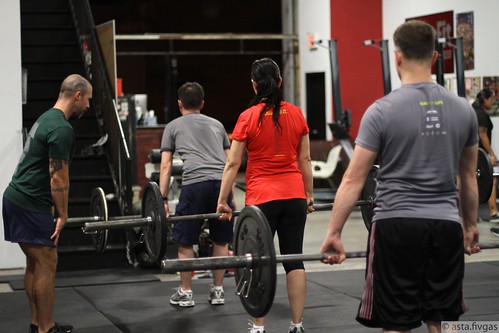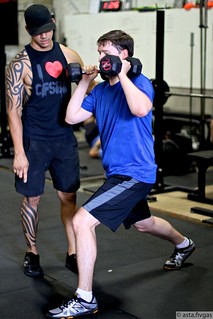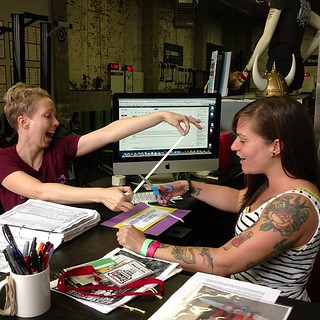
In Part 1, I mentioned that the fundamental principle behind CFSBK’s pay philosophy is that staff is our most important investment. I addressed the first category of a coach’s income, which was Group Classes. Today, I want to discuss the other three categories:
Personal Training and Special Programs
Administrative Duties
Additional Benefits
As I said in my last post, without offering competitive and sustainable wages, you will not be able to hold onto highly skilled professional coaches.
Personal Training
CFSBK’s structure is such that we pay our bills and plan for the future through group class programs, and coaches can create significant bumps to their incomes via Personal Training and Special Programs. We offer a 70/30 split in favor of the coach on all personal training packages and specialized workshops/programs that they run. These are like microbusinesses within the affiliate that coaches can use to help pay their bills and make working full-time as a CrossFit coach realistic and sustainable.
 Coach Josh in a personal training sessionAnyone who has worked at a gym where the management takes the bulk of private training income remembers clearly how much it bothered them. Personal Training requires a unique and different kind of investment from the coach, which is often more demanding than running a group class. More importantly, clients are paying for an hour of time with that specific coach as opposed to simply maintaining a group class membership. I guarantee that the coach is aware of this, and as an affiliate owner, you should be as well.
Coach Josh in a personal training sessionAnyone who has worked at a gym where the management takes the bulk of private training income remembers clearly how much it bothered them. Personal Training requires a unique and different kind of investment from the coach, which is often more demanding than running a group class. More importantly, clients are paying for an hour of time with that specific coach as opposed to simply maintaining a group class membership. I guarantee that the coach is aware of this, and as an affiliate owner, you should be as well.
If a coach spearheads specialized programs (as opposed to the affiliate owner initiating them)—such as powerlifting, Olympic lifting, or CrossFit Kids—my opinion is that they should probably take home the bulk of the income because they’re doing the majority of the work. For example, one of CFSBK’s coaches, Jeremy Fisher, took his personal interest in strength training and created an on-going barbell strength program for our membership. The program began as one eight-week cycle with six people, but has since quadrupled in size. Jeremy does the majority of the work for this program, so he takes home the majority of its profit. Of course, you will need to figure out these arrangements on a case-by-case basis, specific to how you decide to structure special programs.
Administrative Duties
In the early stages of an affiliate, whoever owns it will probably have to do everything from cleaning the gym, to answering every email, in addition to teaching all the classes. But as you grow, delegating administrative responsibilities decreases the burdens you bear as an affiliate owner AND provides additional income sources for people who are probably better than you at dealing with those jobs anyway.
As we've grown, duties like programming for group classes, in-house education, membership management, and a host of other roles have been picked up by coaches motivated to fill in the gaps. Large affiliates will also require specialized staff, such as front desk personnel and a cleaning crew.
 Some arts and crafts at the front deskAt CFSBK, we usually pay a flat rate with established expectations of duties per pay period (which is every two weeks for us). For instance, when I first decided to delegate answering emails about membership issues, I asked one of our coaches who had expressed interest in taking on administrative duties to help me. Then, we established the roles and responsibilities of the position, as well as a rate based on the estimated number of hours she would work.
Some arts and crafts at the front deskAt CFSBK, we usually pay a flat rate with established expectations of duties per pay period (which is every two weeks for us). For instance, when I first decided to delegate answering emails about membership issues, I asked one of our coaches who had expressed interest in taking on administrative duties to help me. Then, we established the roles and responsibilities of the position, as well as a rate based on the estimated number of hours she would work.
A helpful way to figure out how to delegate administrative duties is to sit down and write out every single thing that needs to be done in order to run your business. No job is too small or large in this exercise—remember that you want everything to get done. Then, categorize things according to what motivates or excites you versus what you're not cut out for or would rather have someone else take care of.
When you’re a new affiliate, your name (or the names of you and your partners) will probably be attached to everything on the list. Overtime, you can delegate the ones you’re not great at to other employees. You’ll have to find the right people for the job, but delegating eventually enables you to focus on the things that excite you most about running or working at an affiliate.
Additional Benefits
We’ve gotten to the point at CFSBK where we can afford to give our coaches scholarships for continuing education seminars. Additionally, we help pay for competitions they participate in, which rewards their investment in CrossFit and enriches their experience as an athlete and coach.
We’re also able to afford 100% of the health insurance costs for our full-time coaches and are currently setting up 401(k) plans with percentage matches. I realize these costs may be impossible for many new affiliates to handle, but they should be on your radar as long term goals for the business. Such benefits are some of the many efforts you can make to transition the coaching field from being a job to a profession. For a more insightful exploration on this, check out an article by C.J. Martin of CrossFit Invictus: “Unintended Consequences of Doing the Right Thing.”
_________________________
What are other revenue streams that might increase the income of your coaches?